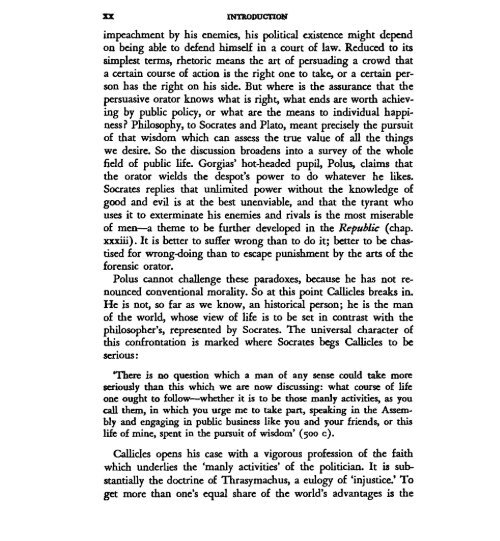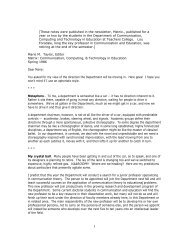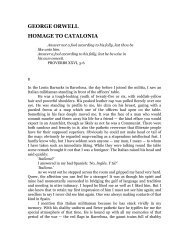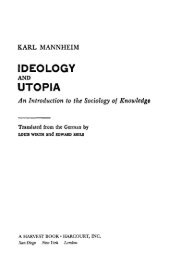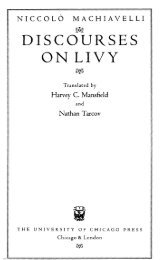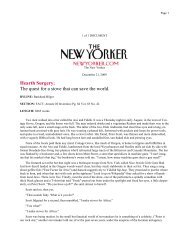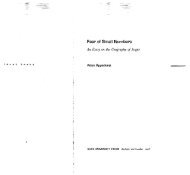THE REPUBLIC OF PLATO - Studyplace
THE REPUBLIC OF PLATO - Studyplace
THE REPUBLIC OF PLATO - Studyplace
Create successful ePaper yourself
Turn your PDF publications into a flip-book with our unique Google optimized e-Paper software.
INTRODUCTION<br />
impeachment by his enemies, his political existence might depend<br />
on being able to defend himself in a court of law. Reduced to its<br />
simplest terms, rhetoric means the art of persuading a crowd that<br />
a certain course of action is the right one to take, or a certain person<br />
has the right on his side. But where is the assurance that the<br />
persuasive orator knows what is right, what ends are worth achieving<br />
by public policy, or what are the means to individual happiness<br />
Philosophy, to Socrates and Plato, meant precisdy the pursuit<br />
of that wisdom which can assess the true value of all the things<br />
we desire. So the discussion broadens into a survey of the whole<br />
fidd of public life. Gorgias' hot-headed pupil, Polus, claims that<br />
the orator widds the despot's power to do whatever he likes.<br />
Socrates replies that unlimited power without the knowledge of<br />
good and evil is at the best unenviable, and that the tyrant who<br />
uses it to exterminate his enemies and rivals is the most miserable<br />
of men-a theme to be further devdoped in the Repuhlic (chap.<br />
xxxiii). It is bener to suffer wrong than to do it; bener to be chastised<br />
for wrong-doing than to escape punishment by the arts of the<br />
forensic orator.<br />
Polus cannot challenge these paradoxes, because he has not renounced<br />
conventional morality. So at this point Callicles breaks in.<br />
He is not, so far as we know, an historical person; he is the man<br />
of the world, whose view of life is to be set in contrast with the<br />
philosopher's, represented by Socrates. The universal character of<br />
this confrontation is marked where Socrates begs Callicles to be<br />
serious:<br />
'There is no question which a man of any sense could take more<br />
seriously than this which we are now discussing: what course of life<br />
one ought to follow-whether it is to be those manly activities, as you<br />
call them, in which you urge me to take pan, speaking in the Assembly<br />
and engaging in public business like you and your friends, or this<br />
life of mine, spent in the pursuit of wisdom' (500 c).<br />
Callicles opens his case with a vigorous profession of the faith<br />
which underlies the 'manly activities' of the politician. It is substantially<br />
the doctrine of Thrasymachus, a eulogy of 'injustice.' To<br />
get more than one's equal share of the world's advantages is the


